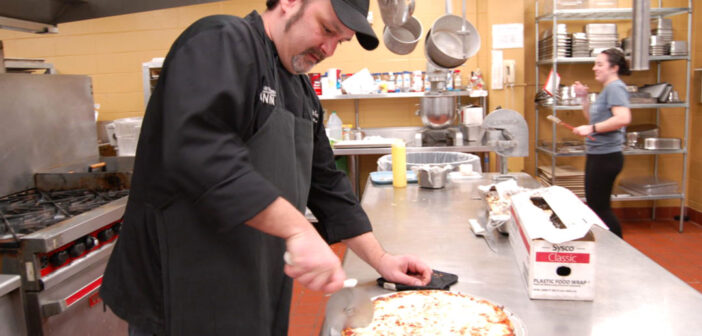After seven years of participating in the Real Food Challenge, Lehigh has surpassed its goal by purchasing 20.3 percent of its food from organic, local, fair and humane sources in the 2019-20 academic year.
The Real Food Challenge is a national campaign that pushes universities to become more sustainable by encouraging the purchasing of “real” over “conventional” food. The Real Food Challenge creates criteria for the standards of real food that universities follow, which changes every year.
“‘Real’ food means that we are doing right by our students, our community and the environment,” said Lauren Sleeger, director of Rathbone Dining. “We are making sure that we are being good stewards for the world around us.”
Katharine Targett Gross, sustainability officer in Lehigh’s Office of Sustainability, described each category of “real” food.
She said “local foods” are sourced from a 150 to 250-mile radius of campus, and that “fair foods” come from locations where employees receive livable wages, rights to benefits and equal pay.
“Ecological food means that the food was grown in a way that is safe not only for the consumer, but also the producer and the planet,” Targett Gross said. “Humane means that the animals are treated in a humane fashion.”
Sleeger believes the dining experience at Lehigh has improved over the years because of the efforts with the Real Food Challenge.
“Overall, the experience of the dining halls has really been elevated because of the quality and the freshness of the products that we are bringing in,” Sleeger said.
Sleeger said non-profits were a game-changer, such as the Common Market in Philadelphia. The Common Market is a non-profit distributor that connects local farms to communities and anchor institutions like Lehigh.
It has been a collaborative effort between Lehigh’s Office of Sustainability, Dining and Purchasing services and Sodexo for the past seven years to move the food budget from “conventional” food to “real” food purchases.
“All of us working together is really what made this happen,” Targett Gross said. “I am very proud of the work that everyone has done.”
Lehigh started its efforts with the Real Food Challenge in 2013. President John Simon signed on in 2017 and pledged that at least 20 percent of the food that Lehigh purchased would be “real.”
The achievement took years of progress. In 2013, Lehigh purchased two percent “real food.” By 2019, Lehigh reached 15 percent.
In the beginning stages of the Real Food Challenge, Bruce Christine, general manager of Dining Services, did not think the 20 percent goal was achievable. He said it was a learning curve and there were some unexpected setbacks, such as the Real Food Challenge creating stricter criteria.
“The big thing is that no one gave up,” Christine said. “We could have easily just said, ‘Forget it, we are done.’ But we didn’t. I am glad we stayed together as a group and kept pushing forward.”
To measure the ‘real’ food challenge metrics, a team of undergraduate students would go to the dining halls every day and record each purchased food item and its characteristics. Each food item would then be researched and classified by the same team of undergraduate students.
Aleksander Gulkewicz, metrics and reporting graduate assistant in the Office of Sustainability, currently oversees the team of undergraduates and previously worked on the challenge as an undergraduate student for three years.
“Eight different groups of undergraduate students have touched this project, which is something to be really proud of,” Gulkewicz said.
Jane Altemose, director of Purchasing Services, said this project would not have been successful without the students who collected the data. She said it has been a learning experience for the students because they did outreach with multiple vendors, students, faculty and staff.
In terms of the future, the team said they are not slowing down their sustainability efforts.
“We are going to take the best practices and keep doing them,” Christine said. “We are just going to go forward.”
The 2030 sustainability strategic plan will be released this fall, Targett Gross said.
Gulkewicz said the team did focus groups at Lehigh and conducted research on peer schools to gather information to create Lehigh’s new plan. He said Lehigh’s policy will incorporate diversity, equity and inclusion.
“This policy will be ours,” Sleeger said. “We are going to define it and show how other universities can do it, and I think that is truly the Lehigh way. We are excited about what the future holds.”






Comment policy
Comments posted to The Brown and White website are reviewed by a moderator before being approved. Incendiary speech or harassing language, including comments targeted at individuals, may be deemed unacceptable and not published. Spam and other soliciting will also be declined.
The Brown and White also reserves the right to not publish entirely anonymous comments.
2 Comments
Lehigh you done good, congrats.
Lehigh improves sustainability efforts within dining you did a great work. congratulations.